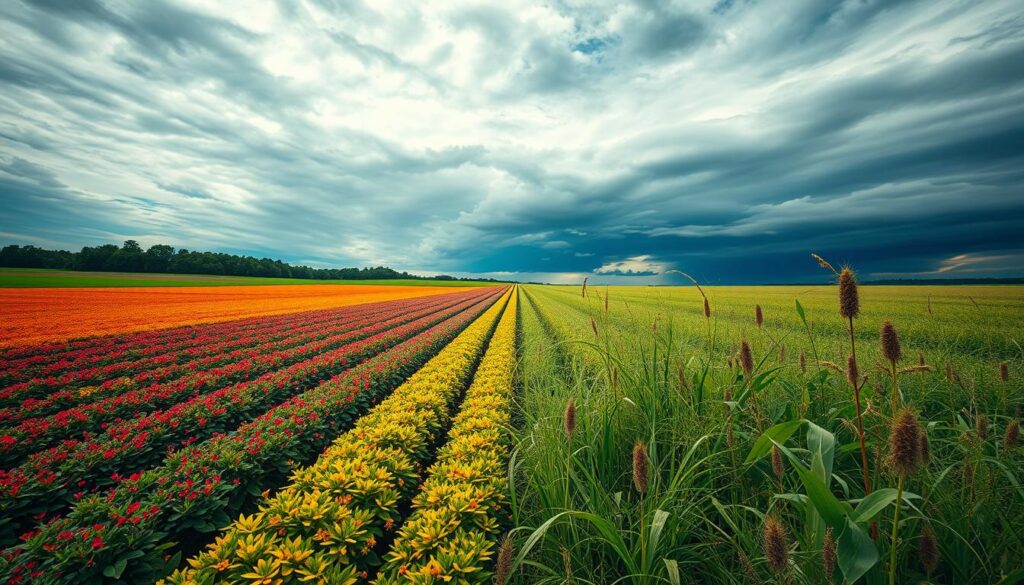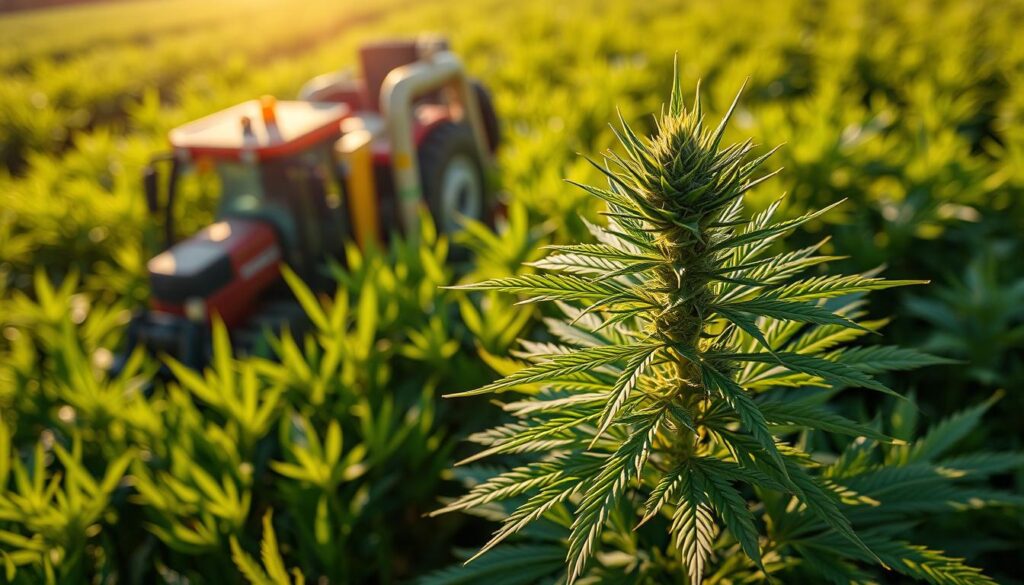Weed management is very important for big companies like Monsanto. Monsanto is known for its work on GMOs and agrochemicals. They have many ways to deal with weeds, but some people don’t agree with them.
In this article, we will look at Monsanto’s weed control methods. We will also talk about the controversies and find better ways to manage weeds.
Key Takeaways
- Monsanto’s role in weed management has evolved with the rise of herbicide-tolerant crops like Roundup Ready.
- The company’s flagship Roundup Ready technology has sparked debates around the environmental impact and development of herbicide-resistant weeds.
- Concerns about Monsanto’s weed control methods, including their reliance on agrochemicals, have led to calls for more sustainable alternatives.
- Integrated Pest Management (IPM) and organic farming offer promising solutions for reducing the environmental footprint of weed control.
- Balancing the demands of modern agriculture with environmental stewardship is crucial for the future of sustainable weed management.
Understanding Monsanto’s Role in Weed Management
Monsanto is a big name in farming. They’ve changed how we grow crops with their technology. This includes making crops that can handle weed killers.
The Rise of Herbicide-Tolerant Crops
Monsanto made crops that can handle their weed killer, Roundup. These herbicide-tolerant crops are also called genetically modified organisms (GMOs). They let farmers kill weeds without hurting their crops.
These Roundup Ready crops are everywhere. They make farming easier and cheaper. Farmers save time and money because of them.
Roundup Ready: Monsanto’s Flagship Technology
Roundup Ready is Monsanto’s biggest hit. It makes crops strong against Roundup. This means farmers can use less weed killer and grow more crops.
Roundup Ready crops are everywhere. They help Monsanto lead the genetically modified organism (GMO) market. Farmers love them for being easy to use and effective.
| Crop | Adoption of Roundup Ready Technology |
|---|---|
| Soybeans | 94% of U.S. soybean acreage |
| Corn | 89% of U.S. corn acreage |
| Cotton | 91% of U.S. cotton acreage |
Monsanto’s Roundup Ready has changed farming a lot. It’s a big part of farming today. But, Monsanto’s big role has also caused some problems. We’ll look at those next.
The Controversy Surrounding Monsanto’s Weed Control Methods
Monsanto is a big name in farming and making chemicals. It’s known for Roundup Ready, a product that uses genetically modified organisms (GMOs) and herbicide-tolerant crops.
Roundup Ready crops can handle the herbicide glyphosate. But, this has caused worries about the environmental impact. Some say it makes weeds stronger, which is bad for farming in the long run.
“Monsanto’s weed control methods have been a source of ongoing controversy, with concerns about the environmental impact and food safety implications of their herbicide-tolerant crops and GMOs.”
There are also worries about food safety with Monsanto’s Roundup Ready. Some research shows glyphosate might harm people’s health. This has led to calls for better testing and rules.
The fight over Monsanto’s weed control shows how tricky GMOs and chemicals are in farming. As Monsanto gets more attention, it’s key for everyone to talk and find ways that help farmers, eaters, and the planet.

weed in Monsanto: Challenges and Concerns
Weed control is a big problem for Monsanto and farming. Herbicide-resistant weeds are a big worry. They make Monsanto’s Roundup Ready crops less effective.
The Development of Herbicide-Resistant Weeds
Using glyphosate-based herbicides like Roundup has led to resistant weeds. These weeds can’t be killed by Roundup anymore. This makes old weed control methods not work.
This problem hurts Monsanto’s technology and worries about future weed control.
Environmental Impact and Sustainable Agriculture
Monsanto’s weed control methods are bad for the environment. Chemical herbicides harm soil, plants, and water. People want farming that’s better for the planet.
Farmers and buyers want green solutions for weeds. Monsanto faces challenges and chances in this new weed control world.
| Weed Management Challenge | Sustainable Agriculture Approach |
|---|---|
| Herbicide-Resistant Weeds | Integrated Pest Management (IPM) techniques, including crop rotation, cover cropping, and mechanical weed control |
| Environmental Impact of Chemical Herbicides | Organic farming methods, natural weed suppression, and minimizing the use of synthetic chemicals |
| Preserving Soil Health | Conservation tillage, cover cropping, and building soil organic matter |

Monsanto and others must solve weed problems. They must also care for the environment and farming’s future.
Alternative Weed Management Strategies
When facing challenges from Monsanto’s weed control, look into other ways. Two good options are Integrated Pest Management (IPM) and organic farming.
Integrated Pest Management (IPM)
IPM uses many methods to fight weeds and pests. It doesn’t rely much on synthetic herbicides. This way, you can use less of Monsanto’s products and help the environment.
Organic Farming and Non-Chemical Approaches
Organic farming is another great choice. It avoids synthetic chemicals and focuses on healthy soil and plant diversity. This method helps manage weeds and makes farming more sustainable.



I Was looking for weed and i came across Zeus weed recommended by a friend . Zeus is super friendly, making it easy to get cannabis products. The delivery service is reliable with professional riders ensuring timely arrivals.
The quality of their products is top-notch, and their customer service is attentive and knowledgeable, offering helpful recommendations. Highly recommended for anyone seeking convenience, quality, and professionalism.
Add his Zangi private number for confidential correspondence text.
Zangi private Number : 1047789965
Click link for zangi : https://services.zangi.com/dl/conversation/1047789965
Contact him email : weedzeus35@gmail.com
Note:
He accept only btc/usdt and do not take cash payment.
Thanks bro, we ordered from him for the first time and couldn’t have been happier. They were willing to drive all the way out to my hotel as fast as possible . They were very helpful when we had a bunch of questions on the strains. We used both the Zangi app and text them directly . Prices are extremely reasonable – cheaper than where we were ordering from for years. They also have the strongest cannabis we’ve seen being sold – which my wife needs for medical reasons.
Will definitely be ordering from Zeus weed again.
Excellent Customer Service!!
It’s so great to speak with nice humans that care about their customers. Every order I’ve made has been 100%.
I will absolutely continue to purchase from Zeus Weed
Zeus Weed is what made my experience great! He was kind to me and patient and answered all my questions. I loved everything about the experience. Highly recommend!
email them.. weedzeus35@gmail.com
Ordering was effortless. The delivery time was faster than expected, and the delivery guy called me to coordinate the pick up spot and was very respectful. The only problem is that i have to send bitcoin which i am not not use to it .